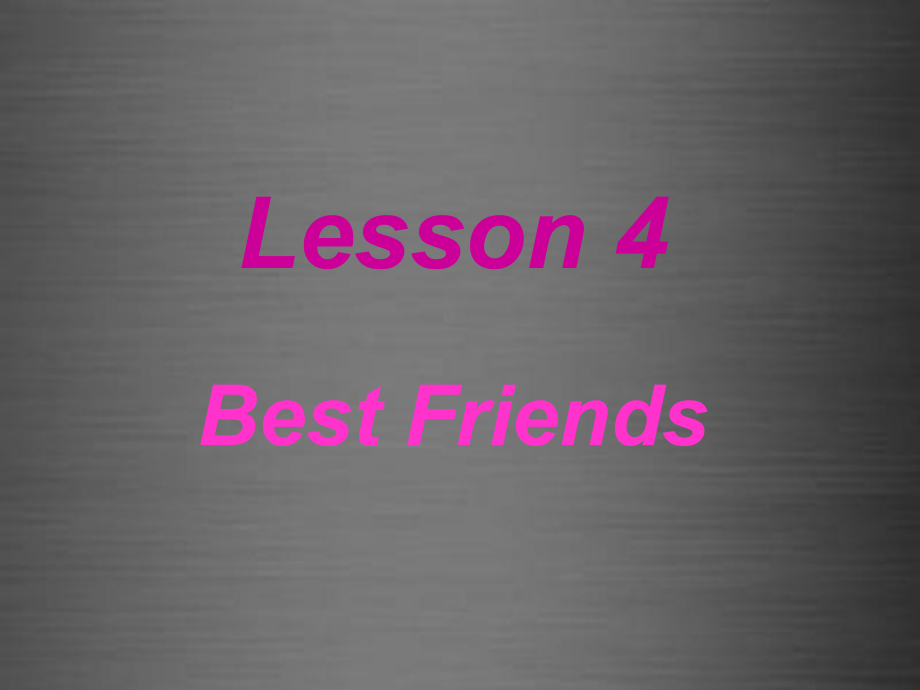《冀教初中英語(yǔ)八上《Lesson 4 Best Friends》PPT課件 (2)》由會(huì)員分享��,可在線閱讀��,更多相關(guān)《冀教初中英語(yǔ)八上《Lesson 4 Best Friends》PPT課件 (2)(17頁(yè)珍藏版)》請(qǐng)?jiān)谘b配圖網(wǎng)上搜索�����。
1�����、Lesson 4 Best FriendsLearning Aims知識(shí)目標(biāo):知識(shí)目標(biāo):1.1.學(xué)會(huì)本課單詞��。學(xué)會(huì)本課單詞��。能力目標(biāo):能力目標(biāo):學(xué)會(huì)評(píng)價(jià)事物���。學(xué)會(huì)評(píng)價(jià)事物��。2.2.掌握本課詞組�、句型。掌握本課詞組���、句型。Chat ShowJ Who is your best friend?J Did you ever argue with your best friend?Why?pea n.豌豆豌豆pod n.豆莢豆莢copy v.抄寫(xiě)��;復(fù)制抄寫(xiě)���;復(fù)制 n.復(fù)制品復(fù)制品surprise n.意想不到的事意想不到的事 v.使驚奇使驚奇angrily adv.憤怒地�;生氣地憤怒地�;生氣地lend
2、 v.借給���;借出借給����;借出cheat v.&n.作弊�����;欺騙作弊;欺騙following adj.接著的���;接下來(lái)的接著的�����;接下來(lái)的gym n.體育館����;健身房體育館����;健身房embarrassed adj.尷尬的;窘迫的尷尬的���;窘迫的enemy n.敵人��;仇人敵人���;仇人deal n.交易交易 v.處理;應(yīng)付處理���;應(yīng)付VocabularyQuestionsWhat did Grant like to play after class?Why did the two boys stop talking to each other?What made the two boys become friends
3�、 again?What agreement did the two boys make?Language Points1.But to his surprise,Patrick didnt agree.但是令他奇怪的是,帕特里克沒(méi)但是令他奇怪的是����,帕特里克沒(méi)有同意。有同意����。surprise 作不可數(shù)名詞時(shí),意為作不可數(shù)名詞時(shí)����,意為“驚奇��;驚奇����;詫異詫異”,常用短語(yǔ)�,常用短語(yǔ)to ones surprise意為意為“令某人驚奇的是令某人驚奇的是”,置于句首��;�,置于句首;in surprise是副詞短語(yǔ),意為是副詞短語(yǔ)���,意為“驚奇地驚奇地”�。e.g.We look at him in surpri
4��、se.我們驚奇地看著他���。We are surprised at his coming.我們對(duì)他的到來(lái)感到很吃驚���。surprise還可作動(dòng)詞,常用短語(yǔ)還可作動(dòng)詞��,常用短語(yǔ)be surprise to do sth.意為意為“很驚訝很驚訝做某事做某事”����,be surprised at 意為意為“對(duì)對(duì)很驚奇很驚奇”。lend作及物動(dòng)詞��,可以接雙賓語(yǔ)����,指作及物動(dòng)詞,可以接雙賓語(yǔ)����,指“借借出出”�����。常用短語(yǔ)��。常用短語(yǔ)lend sb.sth.或或lend sth.to sb.意為意為“把某物借給某人把某物借給某人”���。如:。如:e.g.Can you lend your bike to me?你能把自行車(chē)借給
5��、我嗎�����?lend;borrow;keep辨析辨析2.borrow指指“借入借入”����,常與介詞��,常與介詞from連用�,連用,borrow是短暫性動(dòng)詞���,不能與一段時(shí)間連用��。是短暫性動(dòng)詞����,不能與一段時(shí)間連用。如:如:e.g.e.g.I want to keep the book for another week.這本書(shū)我想再借一周�����。這本書(shū)我想再借一周��。He borrowed a car from his friend and drove it to the park.他從朋友那借了一輛車(chē)并開(kāi)著它去了公園�。keep也可以表示也可以表示“借借”,是延續(xù)性動(dòng)詞��,可以���,是延續(xù)性動(dòng)詞���,可以與一段時(shí)間連用。如:與一
6����、段時(shí)間連用�����。如:spend意為意為“花費(fèi)花費(fèi)”�,主語(yǔ)經(jīng)常是人��,既����,主語(yǔ)經(jīng)常是人,既可以指花費(fèi)金錢(qián)�����,也可指花費(fèi)時(shí)間�。指可以指花費(fèi)金錢(qián),也可指花費(fèi)時(shí)間�����。指花費(fèi)金錢(qián)構(gòu)成的短語(yǔ):花費(fèi)金錢(qián)構(gòu)成的短語(yǔ):spend some money on sth.�,表示花費(fèi)時(shí)間時(shí)用���,表示花費(fèi)時(shí)間時(shí)用spend some time(in)doing sth.�。如:。如:spend;take;cost辨析辨析3.I spent three hundred yuan on the bike last week.我上周買(mǎi)自行車(chē)花費(fèi)了三百元����。e.g.cost意為意為“花費(fèi)花費(fèi)”,指花費(fèi)金錢(qián)�,它是及物,指花費(fèi)金錢(qián)���,它是及物動(dòng)詞�,主
7���、語(yǔ)經(jīng)常是物�,它的過(guò)去式還是動(dòng)詞����,主語(yǔ)經(jīng)常是物,它的過(guò)去式還是cost.如:如:e.g.The sweater cost her twenty dollars yesterday.昨天她花20美元買(mǎi)了那件毛衣����。e.g.It takes me an hour to finish the work.我花費(fèi)一個(gè)小時(shí)完成了那項(xiàng)工作。take指花費(fèi)時(shí)間做某事����,主語(yǔ)常用指花費(fèi)時(shí)間做某事����,主語(yǔ)常用it,有事有事也用物����。常用句型也用物。常用句型It takes sb.some time to do sth.意為意為“花費(fèi)某人時(shí)間去做某事花費(fèi)某人時(shí)間去做某事”��。如:如:Exercises1.She spends
8�、too much money _ clothes every year.2.Danny,please dont say _ that.Its not polite.3.Li Ming,you should make friends _ Danny again.4.Why are you looking at me _ surprise.5.Mr.Zhang gave us a talk _ the end of the meeting.I.根據(jù)句意根據(jù)句意用適當(dāng)?shù)慕樵~填空。用適當(dāng)?shù)慕樵~填空����。atonlikewithin1.The dress is _(make)of blue cotton.2
9、.I have a pair of _(run).I always wear them to play games.3.Is it important _(study)English well?4.Today my father looked very _(worry).5.Dannys _(foot)are bigger than Jennys.II.用所給單詞的適當(dāng)形式填空����。用所給單詞的適當(dāng)形式填空。feetmaderunnersto studyworried1.They both felt too awful.(改為同義句)_ _ _ felt too awful.2.The two g
10���、irls made a deal at last.(改為否定句)The two girls _ _ a deal at last.III.句型轉(zhuǎn)換���,每空一詞����。句型轉(zhuǎn)換�����,每空一詞�。Both of themdidnt make What doesThere wasHow angrily3.They had a basketball game in their school.(改為同義句)_ _ a basketball game in their school.4.Grant went away very angrily.(改為感嘆句)_ _ Grant went away?5.Jenny wants to be a basketball player.(對(duì)劃線部分提問(wèn))_ _ Jenny want to be?HomeworkGuess what will happen next in the story.Then tell your friends.
 冀教初中英語(yǔ)八上《Lesson 4 Best Friends》PPT課件 (2)
冀教初中英語(yǔ)八上《Lesson 4 Best Friends》PPT課件 (2)

